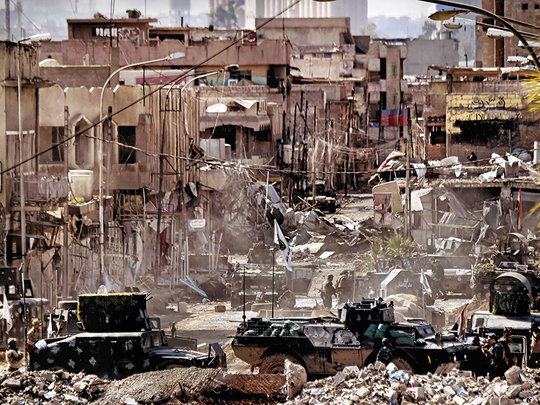
QAYYARA WEST AIRFIELD: A US general in the international coalition in Iraq says that Daesh forces defending western Mosul are disorganised and some foreign fighters are trying to leave the city.
Government forces nonetheless face a “very hard fight” in the battle for the city but they will prevail, US Air Force Brigadier General Matthew Isler said.
Iraqi forces recaptured the eastern half of Mosul in January after 100 days of fighting, and launched an attack on districts lying west of the Tigris river on February 19.
Isler said Daesh’s operational leaders and foreign fighters were withdrawing from the battlefield, leaving local militants to fend off advances by Iraqi forces.
“We do see an intent for them to leave the city. I think that many of them are going to try to find a way out.” Though vastly outnumbered, the militants are putting up fierce resistance to hold on to their last major stronghold.
“At the tactical level it is a very hard fight,” said Isler, deputy commander for the coalition’s air forces.
But, he said: “They’re not well-organised and well-integrated and as a result of that, Iraqi security forces are able to make significant progress each day.”
Many of Daesh’s operational leaders were killed before Iraqi forces began attacking the west, Isler said. There was little doubt that Iraqi security forces would eventually prevail against Daesh.
“The game is up,” Isler said. “They have lost this fight and what you’re seeing is a delaying action.”
Government complex retaken
US-backed Iraqi forces fought their way on Tuesday into the heart of western Mosul, capturing the government complex in this part of the city from Daesh, a senior Iraqi military commander said.
The advancing troops hoisted an Iraqi flag on the complex of buildings in the Dawasa neighbourhood and hailed the federal police units behind the taking of the area as heroes, said Lt-General Abdul Amir Rasheed Yar Allah.
Iraqi security forces also recaptured the Mosul museum, where Daesh militants infamously filmed themselves smashing priceless artefacts, police said on Tuesday.
“Federal police units recaptured the archaeological museum,” Lt-General Raed Shakir Jawdat said in a statement.
The museum was on a police list of sites recaptured from Daesh during an ongoing offensive to reclaim Mosul, along with the central bank building, which was looted by the jihadists.
The consistent advance — more than two weeks since the new push started to clear Mosul’s western side of Daesh militants — has been a major blow to the extremists who once controlled nearly a third of Iraq.
Iraqi forces declared eastern Mosul “fully liberated” in January after officially launching the operation to retake the city in October
Yar Allah, who commands the army operations in Nineveh, where Mosul is the provincial capital, said the troops now also control the western side of a second bridge across the Tigris, known as Hurriyah Bridge.
Last week, the troops reached the first bridge from the south in western Mosul, known locally as the 4th Bridge. US-led air strikes disabled all of Mosul’s five bridges last year in a bid to isolate the militants.
Private broadcaster Lebanon-based Al Mayadeen aired live footage from Mosul, with thick black smoke rising from different areas as gunfire rattled. The TV footage also showed what it said were explosions from two suicide attacks carried out by Daesh militants against the security forces.
The footage also shows the city’s iconic 840-year-old “Crooked Minaret” which leans somewhat like Italy’s Tower of Pisa.
Unlike other heritage and archaeological sites in and around Mosul, the Daesh militants couldn’t destroy it as residents formed a human chain around it to protect it when they came to blow it up.
Mosul is Iraq’s second-largest city, and its western half — the Tigris divides the city into an eastern and a western sections — is the last significant urban area held by Daesh in the country. Mosul fell to Daesh in the summer of 2014, along with large swathes of northern and western Iraq.
Although Iraqi forces have effectively isolated Mosul by cutting the city off from the rest of its self-proclaimed caliphate in Syria, Isler said the militants were still able to travel to the town of Tal Afar to the west.
Setbacks for Daesh
Coalition air strikes in the run-up to the start of the attack on the west had made a significant impact on the course of the battle, Isler said. Many of Daesh’s operational leaders were killed before Iraqi forces began attacking the west.
“We took out their command and control, the Vehicle-Borne Improvised Explosive Devices (VBIED) and weapons caches. They’re using more indirect fire. It’s not precise.”
Although Daesh car bombs still pose a major threat, Isler said fewer than one in 10 now reached their target.
Isler was speaking at the Qayyarah West Airfield, also known as “Q-West”, which Daesh overran in the summer of 2014 after taking Mosul.
Coalition advisers have become more visible near the front lines since December, when Iraqi forces entered an “operational refit” after progress in the east slowed.
Before that, coalition advisers were working with Iraqi forces at the division level, whereas now they are embedded at the brigade level making tactical decisions, Isler said.
“Forty miles north, you are witnessing the defeat of Daesh,” said Isler, standing on a runway to which Daesh militants took a jackhammer before being driven out by Iraqi forces last year.
The repaired main runway is now used by the coalition to resupply its troops in the field and by the Iraqi air force, which is flying no less than 50 sorties per day.
On one of the blast walls enclosing the airfield, the words “The State of the Caliphate will remain” are still visible despite being crossed out. More recent graffiti daubed by the base’s American residents reads: “Make Mosul Great Again”.
— Reuters and AFP












